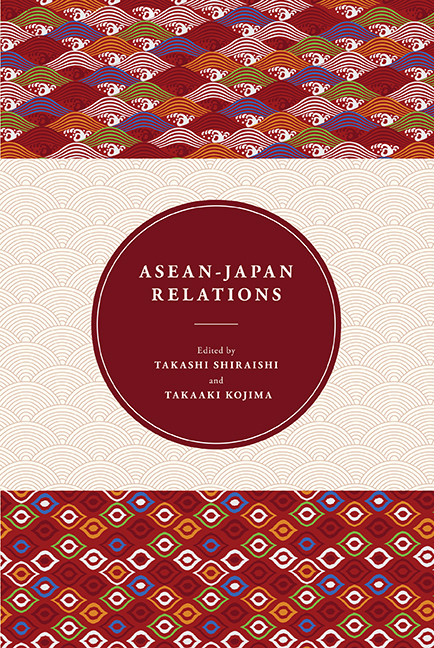Book contents
- Frontmatter
- Contents
- Preface
- About the Contributors
- 1 An Overview of Japan-ASEAN Relations
- 2 Japan's Relations with ASEAN
- 3 Approaches toward Regionalism: Japan, China and the Implications on ASEAN
- 4 The New Japan-ASEAN Partnership: Challenges in the Transformation of the Regional Context in East Asia
- 5 ASEAN-Japan Strategic Partnership and Regional Integration: Impacts and Implications
- 6 ASEAN-Japan Cooperation on Maritime Non-Traditional Security Issues: Toward a New Paradigm
- 7 Japan's Evolving Security Concerns in Maritime Southeast Asia: From Safety of Navigation to “Lake Beijing”
- 8 Evolution of Institutions and Policies for Economic Integration in East Asia: The Rise of China and Changes in the Regional Order
- 9 Managing Integration in East Asia: Behind Border Issues in Japan-ASEAN Trade Agreements
- 10 Regional Financial Cooperation in East Asia: Development and Challenges
- 11 Japanese Development Assistance to ASEAN Countries
- 12 Japanese Foreign Direct Investment in the ASEAN-4 Countries
- 13 Japan's Triple Tsunami
- 14 ASEAN-Japan Relations: A Singapore Perspective
3 - Approaches toward Regionalism: Japan, China and the Implications on ASEAN
Published online by Cambridge University Press: 21 October 2015
- Frontmatter
- Contents
- Preface
- About the Contributors
- 1 An Overview of Japan-ASEAN Relations
- 2 Japan's Relations with ASEAN
- 3 Approaches toward Regionalism: Japan, China and the Implications on ASEAN
- 4 The New Japan-ASEAN Partnership: Challenges in the Transformation of the Regional Context in East Asia
- 5 ASEAN-Japan Strategic Partnership and Regional Integration: Impacts and Implications
- 6 ASEAN-Japan Cooperation on Maritime Non-Traditional Security Issues: Toward a New Paradigm
- 7 Japan's Evolving Security Concerns in Maritime Southeast Asia: From Safety of Navigation to “Lake Beijing”
- 8 Evolution of Institutions and Policies for Economic Integration in East Asia: The Rise of China and Changes in the Regional Order
- 9 Managing Integration in East Asia: Behind Border Issues in Japan-ASEAN Trade Agreements
- 10 Regional Financial Cooperation in East Asia: Development and Challenges
- 11 Japanese Development Assistance to ASEAN Countries
- 12 Japanese Foreign Direct Investment in the ASEAN-4 Countries
- 13 Japan's Triple Tsunami
- 14 ASEAN-Japan Relations: A Singapore Perspective
Summary
Japan has enjoyed amicable relations with the Association of Southeast Asian Nations (ASEAN) since it was granted Dialogue Partner status in 1977. But like other key partners of ASEAN, Japan has been from time to time constrained by other equally important foreign policy issues that might have obstructed the development of their bilateral relationship. Japan has undoubtedly invested its diplomatic energy overwhelmingly in its alliance with the United States, a foreign policy choice deemed imperative from Japan's strategic perspective. Japan lives side by side with historical enemies, China and South Korea, with China now emerging as a rising power. Its relationship with them is today shaped in part by renewed friendship as much as embittered historical memories. Japan has recently intensified territorial claims in the East China Sea against China and South Korea, even though the latter countries’ leaders attempted to strengthen relations with Japan. At one point, protests against Japan in various parts of China further deteriorated bilateral ties. Meanwhile, China's close ties with North Korea have affected the region's security outlook and at times worried Japan and South Korea. The March 2013 meeting between the vice ministers of defense of Japan and ASEAN disclosed a real concern over the tension on the Korean Peninsula, particularly after North Korea undertook its third nuclear test. In part, security concerns on the Korean Peninsula have dictated Japan's strategic considerations and thus legitimized the country's close cooperation with the United States. Such conditions have formed a certain viewpoint within Japan in regard to its approach toward regionalism, and in particular to its relations with ASEAN. Yet, it is imperative to note here that those conditions are not the only factors that explain the current state of ASEANJapanese relations. After all, ASEAN has remained important in Japan's Asia policy.
Japan's relations with ASEAN have been solid mainly because there were no outstanding disputes between the two sides, neither political nor economic. Successive Japanese governments have offered generous financial aid and technical assistance to a number of ASEAN countries as well as supporting Japanese conglomerates investing in ASEAN's markets. In retrospect, Japan's diplomatic activism toward Southeast Asia was seen in the mid-1960s but was more evident in 1977 following the announcement of the Fukuda Doctrine.
- Type
- Chapter
- Information
- ASEAN-Japan Relations , pp. 38 - 54Publisher: ISEAS–Yusof Ishak InstitutePrint publication year: 2013

